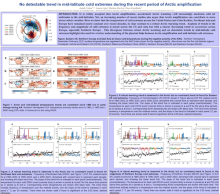No detectable trend in mid-latitude cold extremes during the recent period of Arctic amplification
Judah
Cohen
Verisk Atmospheric and Environmental Research/Department of Civil and Environmental Engineering, Massachusetts Institute of Technology
Poster
It is widely accepted that Arctic amplification—accelerated Arctic warming—will increasingly moderate cold air outbreaks to the mid-latitudes. Yet, an increasing number of recent studies also argue that Arctic amplification can contribute to more severe winter weather. Here we show that the temperature of cold extremes across the United States east of the Rockies, Northeast Asia and Europe have remained nearly constant over recent decades, in clear contrast to a robust Arctic warming trend. Analysis of trends in the frequency and magnitude of cold extremes is mixed across the US and Asia but with a clearer decreasing trend in occurrence across Europe, especially Southern Europe. This divergence between robust Arctic warming and no detectable trends in mid-latitude cold extremes highlights the need for a better understanding of the physical links between Arctic amplification and mid-latitude cold extremes.

cohen-judah-polar-poster.pdf
(885.02 KB)
